Click to join the conversation with over 500,000 Pentecostal believers and scholars
Click to get our FREE MOBILE APP and stay connected
| PentecostalTheology.com



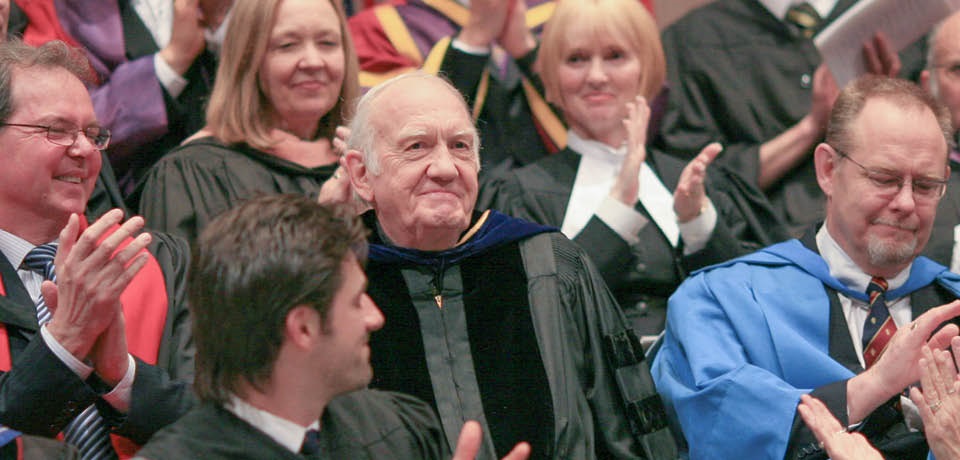
“Do not believe it!” he said, standing atop a desk. “He is singing with his Lord and his king.”
Then, instead of handing out the syllabus like a normal professor, he led the class in Charles Wesley’s hymn, “O For a Thousand Tongues to Sing.”
Fee, a widely influential New Testament teacher who believed that reading the Bible, teaching the Bible, and interpreting the Bible should bring people into an encounter with a living God, described himself as a “scholar on fire.” He died on Tuesday at the age of 88—although, as those who encountered him in the classroom or in his many books know, that’s not how he would have described it.
Fee co-wrote How to Read the Bible for All Its Worth with Gordon-Conwell Theological Seminary colleague Douglas Stuart in the early 1980s. The book is now in its fourth edition and has sold around 1 million copies, becoming for many the standard text on the best way to approach Scripture. Fee also wrote a widely used handbook on biblical interpretation, several well-regarded commentaries on New Testament epistles, and groundbreaking academic research on the place of the Holy Spirit in the life and work of the Apostle Paul.
“If you had asked Paul to define what a Christian is,” Fee once told CT, “he would not have said, ‘A Christian is a person who believes X and Y doctrines about Christ,’ but ‘A Christian is a person who walks in the Spirit, who knows Christ.’”
In the same way, Fee argued that studying the form, history, and context of Scripture is worthwhile because it is not “mere history.” Done correctly, biblical interpretation is a touch of lightening.
“We bring our exegesis to fruition when we ourselves sit with unspeakable wonder in the presence of God,” he wrote. “We must hear the words with our hearts, we must bask in God’s own glory, we must be moved to a sense of overwhelming awe at God’s riches in glory, we must think again on the incredible wonder that these riches are ours in Christ Jesus, and we must then worship the living God by singing praises to His glory.”
As news of his death spread on social media, ministers and seminary professors from across the evangelical spectrum shared which of Fee’s books meant the most to them. Western Seminary New Testament professor Wesley Hill said God’s Empowering Presence was one of the most influential texts he had read. Greg Salazar, a Presbyterian Church in American pastor, wrote that he is using Fee’s commentary on Philippians for a sermon series. Peter Englert, a minister at a nondenominational church in New York, praised Fee’s commentary on 1 Corinthians.
It is with great sadness that we announce the death of Professor Emeritus Dr. Gordon D. Fee. Gordon died October 25, 2022, in New York City.
Gordon was a beloved member of Regent’s faculty, serving as Professor of New Testament from 1986 to 2002. Following his retirement and appointment as Professor Emeritus, Gordon served the College as a favorite sessional instructor until 2009. He was a treasured colleague, teacher, friend, and pastor to many.
Gordon brought a remarkable store of intellect and pastoral concern to New Testament scholarship and to his teaching. He was often quoted as saying, “The concern of the scholar is primarily with what the text meant; the concern of the layperson is usually with what it means. The believing scholar insists that we must have both.”
His books How to Read the Bible for All Its Worth (co-authored with Douglas Stuart), and God’s Empowering Presence: The Holy Spirit in the Letters of Paul continue to be seminal works and best sellers. Gordon also wrote highly-regarded commentaries on 1 and 2 Timothy, 1 Corinthians, 1 and 2 Thessalonians, and Revelation.
Gordon is considered one of the finest textual critics of the twentieth century and an expert on pneumatology, the study of the Holy Spirit. In 1990 Gordon was selected to succeed the revered F. F. Bruce as the editor of the noted New International Commentaries series, a role he carried out until 2012.
Dr. Douglas Moo, Wessner Chair of Biblical Studies at Wheaton College, had a close working relationship with Gordon. Reflecting on Dr. Fee’s influence, he observed: “Gordon Fee had an enormous influence on many aspects of biblical scholarship and the Christian life. Perhaps one of the least known, however, is his over thirty years of work on the Committee on Bible Translation, the team of scholars responsible for the New International Version of the Bible. Readers of that Bible, the widest read of all modern English Bibles, will encounter his translation suggestions on almost every page.
“If I might speak more personally, I have fond memories of Gordon announcing, about an issue we were debating, ‘I have no passion for this’—only to go on to argue passionately about the matter! This passion for Christ and for accurate understanding and communication of the Scripture marked all his service for the Lord.”
Gordon’s lifelong aspiration was to be a “scholar on fire.” As a young man, Gordon heard a sermon with significant errors, and upon speaking with the preacher to bring clarification, he was rebuked with the words, “I’d rather be fool on fire than a scholar on ice.” Gordon wrote that from that day onward, “in prayer and repentance, I committed before my Lord that I would by God’s gracious beneficence try to pursue excellence in scholarship and remain passionate in my walk with God; I would try to be a scholar on fire.” Students, colleagues, and pastors would conclude that he became precisely that.
Dr. Rikk Watts, also a Professor of New Testament at Regent, worked alongside Gordon for many years. Reflecting on Gordon’s impact, Rikk pointed to this powerful integration of devotion and academic excellence: “One of the foremost exegetes of his day, Gordon’s rigorous classes were even more singularly known for their encounters with his Lord. He taught thousands of students around the world that one could be a ‘scholar on fire.’ I will be forever grateful for his daily demonstration that a deep personal love for Jesus, care for his church, and careful scholarship flourished best when done in that order.”
Born in Ashland, Oregon, in 1934, Gordon’s father was an Assemblies of God pastor and a respected carpenter. At that time, Assemblies of God pastors were known for their focus on the Holy Spirit. At times, Gordon noted, their “passion overshadowed textual accuracy.”
Gordon earned his BA and MA from Seattle Pacific University, where he ran track and majored in Biblical Studies. There he met and married Maudine Lodfahl, a fellow SPU student and an elementary school teacher. Gordon was encouraged to pursue teaching and doctoral work, and upon graduation he and Maudine moved to Los Angeles, where he completed a PhD in New Testament at the University of Southern California. During that time, Gordon and Maudine welcomed three sons and a daughter into their family.
The Fees soon moved to Illinois, where Gordon taught New Testament at Wheaton College. In 1974, they moved to Gordon-Conwell Theological Seminary in South Hamilton, Massachusetts, where Gordon taught for twelve years. In the summer of 1986, Gordon and Maudine—thrilled to return to their beloved west coast—moved to Vancouver, where Gordon began teaching at Regent. In 2010 Gordon and Maudine returned east to New York City to be near their sons. They attended Redeemer Presbyterian Church.
Throughout his academic career, Gordon was a beloved teacher and valued thesis supervisor. He supported students struggling with exegesis or Greek with patience and encouragement. Often teased for preaching instead of teaching, Gordon would wince, laugh, and admit, “I just can’t help it! I try not to!” He was equally good-humoured when it was noted that his lectures could be heard as far as the Regent parking lot, immediately asking, “Was it any good?”
While living in Vancouver, Gordon and Maudine were active members of University Chapel, where Gordon preached, led retreats, and frequently served the post-service coffee. They were also founding members of Hunterston Farm, a community-owned property on Galiano Island, where they enthusiastically shared their home for Regent courses and retreats. Gordon was often heard singing hymns while chopping copious piles of wood early in the morning.
Pastor John Crosby, a student of Gordon’s at Wheaton and Gordon-Conwell, remembers his first day of New Testament Literature when Gordon boldly jumped up on the desk at the front of the class and announced, “This is not a class on New Testament! This is a class on immortality! Some day you will hear ‘Fee is dead.’ Do not believe it! He is singing with his Lord and his King!!”
Gordon then led the class in singing “O For a Thousand Tongues to Sing.”
Maudine Fee died in 2014, and Gordon leaves behind four children—Mark (Robin), Cherith Fee Nordling (Robert), Brian (Maria), and Craig (Ellen)—thirteen grandchildren, and two great-grandchildren (with two more on the way).
Plans are being made for a memorial service in New York City. There will also be a public memorial service in Vancouver, BC, next spring.
Honoring Pentecostal Theologian Gordon Fee
Gordon D. Fee, PhD (University of Southern California) is Professor Emeritus of New Testament Studies at Regent College in Vancouver, Canada.
The Society for Pentecostal Studies held a special session to honor the life and work of Dr. Gordon Fee in November 2014 as a part of the joint American Academy of Religion and the Society of Biblical Literature annual meetings held in San Diego, California.
See “The Legacy of a Pentecostal Theological Educator: Gordon Fee” that I wrote for the January 2015 issue of The Pentecostal Educator Newsletter (available as of Jan 18, 2015 at this address: http://wapte.org/the-pentecostal-educator-newsletter/)
A lifelong educator and leading scholar of Pauline pneumatology, Fee is the author of numerous books including:
Co-authored with Douglas Stuart, How to Read the Bible for All Its Worth (Zondervan, 1981, 1993, 2003, 2014)
God’s Empowering Presence: The Holy Spirit in the Letters of Paul (Baker, 1994, 2009)
Co-authored with Mark L. Strauss, How to Choose a Translation for All Its Worth: A Guide to Understanding and Using Bible Versions (Zondervan, 2007) [Read the review by John Lathrop]
Paul’s Letter to the Philippians, New International Commentary on the New Testament (Eerdmans, 1995)
Philippians, The IVP New Testament Commentary Series (IVP, 1999)
Listening to the Spirit in the Text (Eerdmans, 2000) [Read the review by Steven Brooks]
Pauline Christology: An Exegetical-Theological Study (Hendrickson, 2007) [Read the review by Bradford McCall]
Paul, the Spirit, and the People of God (Hendrickson/Baker Academic, 1996)
To What End Exegesis?: Essays Textual, Exegetical, and Theological (Eerdmans, 2001)
Co-authored with Douglas Stuart, How to Read the Bible Book by Book: A Guided Tour (Zondervan, 2009)
Codex Sinaiticus in the Gospel of John: A Contribution to Methodology in Establishing Textual Relationships, Studies in the Theory and Method of New Testament Textual Criticism (Eerdmans, 1993)
Because of the onset of Alzheimer’s, his final publication will be his revised and updated commentary The First Epistle to the Corinthians in the New International Commentary on the New Testament (Eerdmans, 1987, 2014).
Find numerous audio recordings (MP3s and CDs) of Gordon Fee, including entire lecture series, available from RegentAudio: http://www.regentaudio.com/collections/gordon-fee
Videos from the SPS Session Honoring Gordon Fee
- Blaine Charette, Mark Fee, Russell Spittler, and Murray Dempster (Blaine Charette chaired the special session)
- Sven Soderlund
- Andrew Lincoln (shared by John Christopher Thomas)
- Rick Watts
- Marianne Meye Thompson
- Ron Herms
- Gordon Fee’s Response
It was, to be sure, a celebration that brought us to tears multiple times.



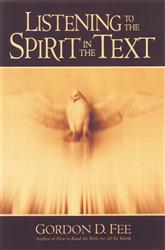
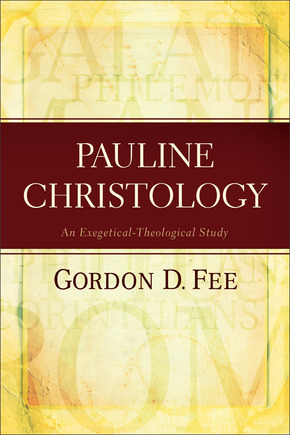
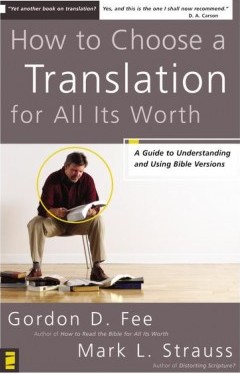
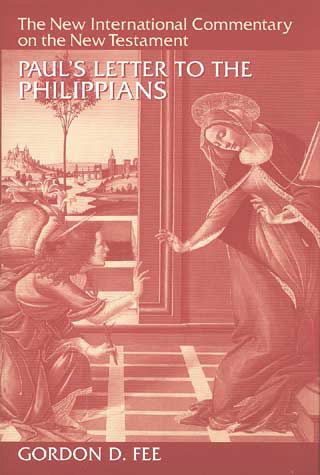
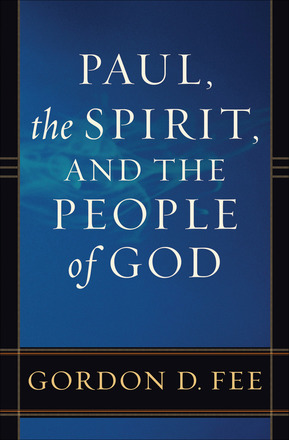

Most Talked About Today